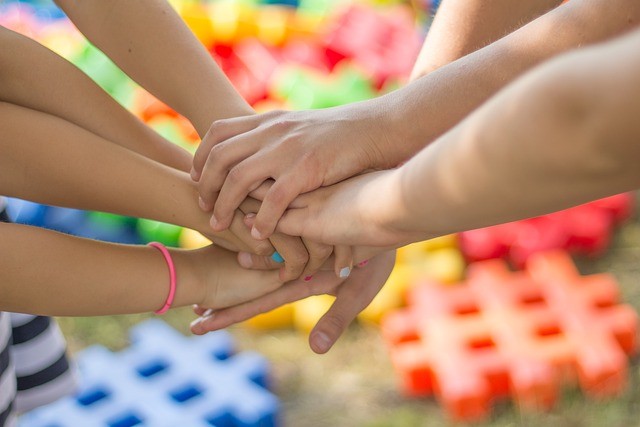Welcome to an exploration of the magical world of play and its profound impact on child development. Play is not just a frivolous activity; it is a fundamental aspect of childhood that shapes children’s physical, cognitive, social, and emotional growth. In this article, we will delve into the various dimensions of play and uncover its incredible benefits for children.
From the moment they are born, children instinctively engage in play as their primary mode of learning about themselves and the world around them. Whether it’s through imaginative pretend play or structured games with rules, every playful interaction contributes to their overall development.
Physically, play provides opportunities for children to enhance their motor skills and coordination. From crawling to running, jumping to climbing trees or swinging on swings – these activities help strengthen muscles and improve balance. Moreover, engaging in active outdoor play promotes healthy habits by encouraging physical fitness from an early age.
Cognitively speaking, play stimulates curiosity and creativity while fostering problem-solving skills. Through open-ended activities like building blocks or puzzles, children learn how things fit together and develop spatial awareness. Role-playing scenarios allow them to explore different perspectives and develop critical thinking abilities.
Socially, playing with others teaches important life skills such as cooperation, negotiation, empathy, and communication. Whether it’s sharing toys during a game or taking turns in group activities like team sports or board games – these experiences lay the foundation for positive social interactions throughout life.
Emotionally speaking, play provides an outlet for self-expression where children can freely explore their feelings without judgment. It allows them to process emotions such as joy or frustration while developing resilience in dealing with challenges they encounter during playtime.
In today’s fast-paced world filled with screens vying for attention at every turn; it is crucial not to underestimate the power of unstructured free-play in nurturing well-rounded individuals who are adaptable problem solvers capable of thinking outside the box.
So, join us on this journey as we uncover the wonders of play and its transformative effects on child development. Prepare to be amazed by the multitude of ways in which play shapes children’s lives, fostering growth, and laying the groundwork for a bright future.
The Power of Play & Its Benefits
Play isn’t just something children do to pass the time; it’s vital for their overall development and how they see the world. Encouraging play is vital, whether children play with their siblings or friends, with their parents, or alone.
To help you understand just how vital play is, let’s take a look at the unwavering benefits.
Cognitive Development Through Play
Play is not only enjoyable for children but also crucial for their cognitive growth and development. Here are some ways in which play can support cognitive development:
- Problem-solving skills: Play often involves solving puzzles, building structures, or figuring out strategies in games. These activities help children develop their problem-solving skills by encouraging them to think critically and find creative solutions.
- Memory and concentration: Many types of play require children to remember rules, sequences, or patterns. By engaging in memory-based games or activities, children can enhance their memory skills and improve their ability to concentrate on tasks.
- Language development: Pretend play allows children to use language creatively as they engage in role-playing scenarios or create imaginary worlds. This type of play helps develop vocabulary, grammar, storytelling abilities, and communication skills.
- Spatial awareness: Building with blocks or playing with puzzles can enhance a child’s spatial awareness and understanding of shapes and sizes. These activities promote the development of visual-spatial skills necessary for tasks such as reading maps or assembling objects.
- Mathematical thinking: Many games involve counting, sorting objects by size or colour, or recognizing patterns – all of which contribute to the development of mathematical thinking in young minds.
Remember that providing a variety of open-ended toys (such as building blocks) alongside structured games can offer opportunities for both independent exploration as well as guided learning experiences that support cognitive growth through play.
Social and Emotional Development Through Play
Social and emotional development through play is a crucial aspect of a child’s growth and well-being. Play provides children with opportunities to explore, interact, and express themselves in a safe and enjoyable environment. It allows them to develop essential social skills, such as communication, cooperation, empathy, and problem-solving.
During playtime, children engage in various activities that promote social interaction. They learn how to take turns, share toys or materials with others, negotiate conflicts or disagreements peacefully, and collaborate on tasks or imaginative scenarios. These experiences help them understand the importance of respecting others’ boundaries and opinions while fostering positive relationships with their peers.
Play also serves as an avenue for emotional expression. Through pretend play or role-playing games, children can act out different emotions they may be experiencing—joy, sadness, anger—and learn how to manage them effectively. By exploring these emotions within the context of playtime scenarios, they gain valuable insights into their own feelings as well as those of others.
Furthermore, play encourages creativity and imagination—a vital aspect of emotional development. Children have the freedom to create their own worlds where they can experiment with different roles or situations. This imaginative exploration helps them develop empathy by putting themselves in someone else’s shoes or understanding diverse perspectives.
In addition to fostering social skills and emotional intelligence individually, play also facilitates group dynamics among children. Whether it’s building structures together with blocks or engaging in team sports activities like soccer or basketball—play enables children to work collaboratively towards common goals while learning effective communication strategies within a group setting.
Parents and caregivers can support social-emotional development through play by providing ample opportunities for unstructured free playtime both at home and in community settings like parks or playgrounds. They can encourage open-ended toys that allow for creativity rather than relying solely on technology-based entertainment options.
Physical Development Through Play
Play not only provides children with enjoyment and entertainment, but it also helps them develop their motor skills, coordination, strength, and overall physical fitness. Here are some ways in which play can contribute to physical development:
- Gross motor skills: Activities like running, jumping, climbing, and playing sports help children develop their gross motor skills. These activities require the use of large muscle groups and promote balance, coordination, and body awareness.
- Fine motor skills: Play involving small objects such as building blocks or puzzles can enhance fine motor skills. Manipulating these objects helps children refine their hand-eye coordination and dexterity.
- Balance and coordination: Engaging in activities that challenge balance such as riding a bike or playing on a balance beam can improve a child’s sense of equilibrium and spatial awareness.
- Strength building: Playgrounds with equipment like swings, monkey bars, or climbing structures provide opportunities for children to strengthen their muscles through pushing/pulling movements or supporting their own body weight.
- Cardiovascular fitness: Active play that gets the heart rate up—such as tag games or dancing—can improve cardiovascular health by increasing endurance levels.
- Sensory integration: Sensory play involving different textures (sand/water), sounds (musical instruments), or visual stimuli (colourful toys) helps children integrate sensory information from their environment while engaging in physical activity.
- Body control: Activities like yoga or martial arts encourage body control by teaching proper breathing techniques along with precise movements that require focus and concentration.
Remember to always ensure safety during playtime by providing appropriate supervision based on the child’s age group and using age-appropriate toys/equipment suitable for their developmental stage.
Play-Based Learning and Academic Achievement
Play-based learning is an approach to education that emphasizes the use of play as a means for children to learn and develop important skills. It has been shown to have numerous benefits, including enhancing academic achievement.
Here are some ways in which play-based learning can contribute to academic success:
- Engagement: Play-based learning actively engages children in the learning process, making it more enjoyable and motivating for them. When children are engaged, they are more likely to retain information and apply it in their academic pursuits.
- Critical thinking: Play-based activities often require problem-solving and critical thinking skills, which are essential for academic success. Through play, children learn how to analyse situations, make decisions, and think creatively – all of which transfer well into their academic work.
- Social interaction: Play-based learning encourages collaboration and communication among peers. These social interactions help develop important social skills such as teamwork, empathy, negotiation, and conflict resolution – all of which contribute positively to classroom dynamics and overall academic achievement.
- Language development: Many play activities involve storytelling or imaginative play scenarios that require verbal communication. This helps enhance language development by expanding vocabulary, improving sentence structure, and fostering effective communication skills – all crucial elements for success in reading comprehension and written expression.
- Emotional well-being: Play provides a safe space for children to explore their emotions while developing self-regulation skills such as patience or resilience when faced with challenges during games or pretend-play scenarios. Emotional well-being is closely linked with cognitive functioning; therefore, a positive emotional state resulting from play can support better focus on academics.
- Motivation: By incorporating elements of choice into play-based learning experiences (e.g., allowing children to select activities or themes), intrinsic motivation is fostered within students since they feel a sense of ownership over their own education journey.
- Creativity & Imagination: Play allows children’s imaginations to run wild! Engaging in imaginative play fosters creativity, which is a valuable skill in problem-solving and critical thinking.
By integrating play-based learning into the educational environment, parents and teachers can create a balanced approach that supports both academic achievement and holistic development in children.
Types of Play & Their Benefits
There are several types of play, each with its own unique benefits. Here are a few examples:
- Physical Play: This type of play involves physical movement and can include activities like running, jumping, climbing, or playing sports. Physical play helps children develop gross motor skills, coordination, strength, and overall fitness.
- Imaginative Play: Also known as pretend play or role-playing, this type of play involves using the imagination to create scenarios and take on different roles. It helps children develop creativity, problem-solving skills, language development, empathy, and social skills.
- Constructive Play: This type of play involves building or creating things using various materials like blocks, Legos, or art supplies. Constructive play enhances fine motor skills development while fostering creativity and problem-solving abilities.
- Social Play: This type of play involves interacting with others through games or activities that require cooperation and communication. Social play promotes social skills development such as sharing, taking turns, negotiation abilities while building friendships and empathy.
- Sensory Play: Sensory play engages the senses (sight, sound, touch, taste, and smell) through activities like playing with sand, water, paints, dough etc. It helps in developing sensory integration, fine motor skills, cognitive abilities, and emotional regulation.
- Cognitive/educational Play: This includes puzzles, games involving numbers, letters etc. This kind of plays help in cognitive development, problem solving, language acquisition, etc.
Remember that these types of plays often overlap with one another in practice. Encouraging a variety of playful experiences can provide children with a well-rounded set of benefits for their overall growth and development.
Play Environments & Resources
When encouraging your child to play, remember to ensure a safe and stimulating environment. This will keep them out of harm’s way and also ensure that they’re completely ‘into’ the activity they’re doing. You should also use play materials that are designed to promote child development, and which are age appropriate.
Remember to head outdoors and encourage outdoor play and nature exploration too. In this way, you’re nurturing and encouraging play activities, while also helping your child to develop a love and appreciation for nature.
Finally, remember to provide guidance and support during play, and ensure there is a balance between structured and unstructured play. Giving guidance doesn’t mean dictating the activity, but giving your child prompts and allowing them to use their own minds and creativity.
Conclusion
The benefits of play on child development are undeniable and it’s without a doubt the easiest way for your child to learn! They won’t even realise they’re taking new knowledge on board, and they’ll enjoy the whole process so much more. Fostering a love of learning is so important, and play is the ideal way to do just that.
Looking for ways to prioritise and promote play in your child’s life is an important part of their developmental journey, and thankfully, there are many resources out there to help you do just that.




